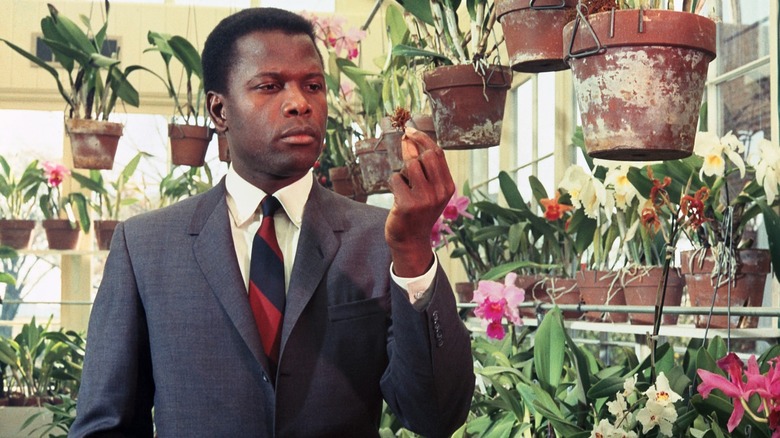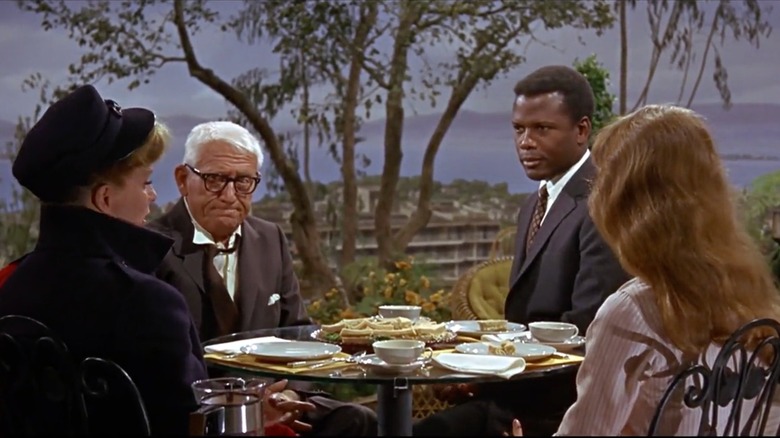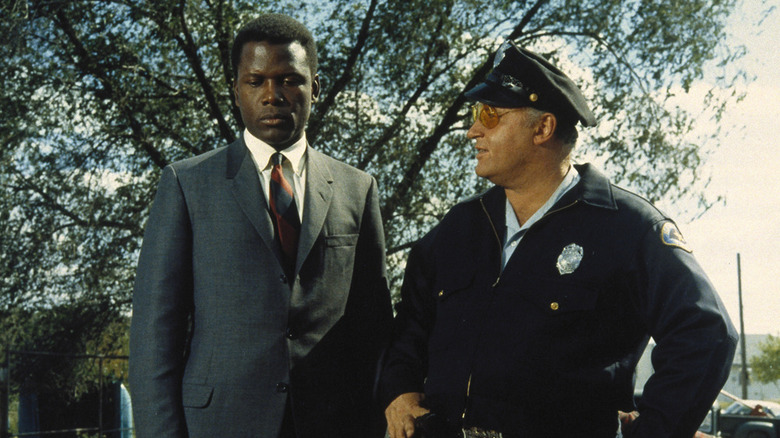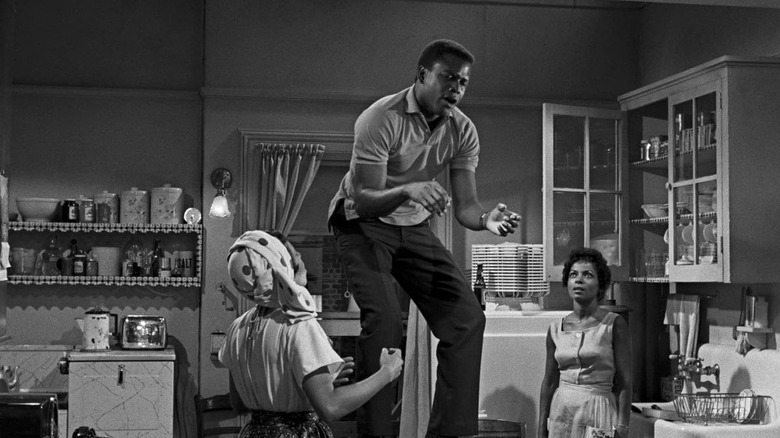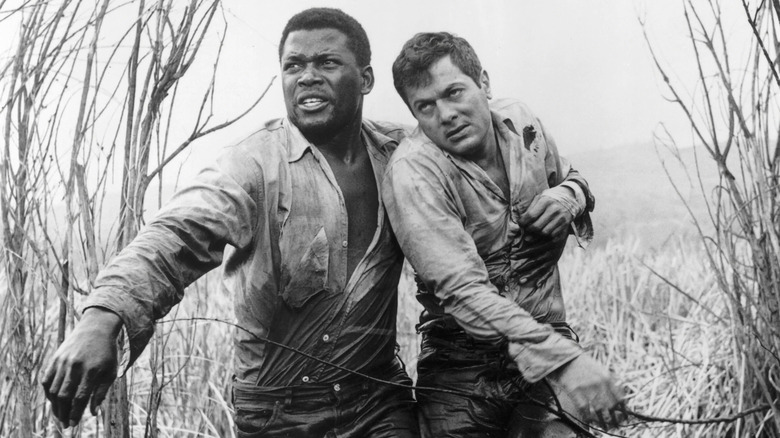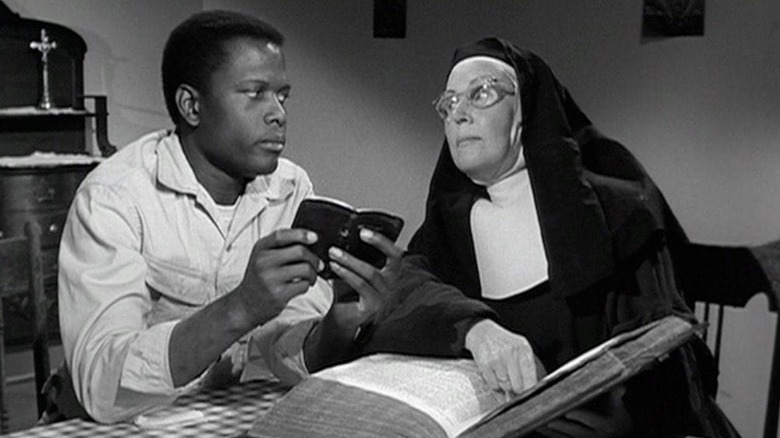5 Brilliant Sidney Poitier Movies And Where You Can Watch Them
We may receive a commission on purchases made from links.
Activist, trailblazer, and acting icon Sidney Poitier has died, and what better way to honor his legacy than by watching some of his best performances? The Bahamian actor performed in dozens of movies, a handful of television shows, and he was even nominated for a Tony award for his work in theatre. Poitier was the first Black man to ever win an Academy Award, for his role in the 1963 dramedy "Lilies of the Field," and he would continue to break racial barriers throughout his career. While much of his work, like the groundbreaking "Guess Who's Coming to Dinner" and "In the Heat of the Night," is focused on race and racial injustice, others, like "Lilies," are simple stories made more profound by Poitier's performance.
Here are five of Sidney Poitier's best, along with where you can find them to stream or rent.
Guess Who's Coming to Dinner
Where You Can Watch It: Streaming on STARZ, available to rent on Google Play and YouTube for $3.99.
While certain elements of "Guess Who's Coming to Dinner" are a bit antiquated, it's a fascinating glimpse into Civil Rights-era America starring some of the greatest performers who have ever lived. Joey Drayton (Katharine Houghton) returns to her parent's home in San Francisco after a vacation in Hawaii and is bringing along her fiancé, Dr. John Prentice (Poitier). She also invites John's parents to come visit from Los Angeles, and they have no idea that their future daughter-in-law is white. What unfolds is the world's most awkward family dinner, in which racial tensions are brought to a head when John's father, played by Roy Glenn, explains that if the couple get married, they'll be breaking the law in "16 or 17 states." The U.S. Supreme Court actually determined that laws against mixed marriages were unconstitutional only a few weeks after filming on "Guess Who's Coming to Dinner" completed.
Beloved actor Spencer Tracy plays Joey's father, and his wife is played by Katharine Hepburn. The performances are stellar, and the conversations these characters have about race, love, and life are all indicative of their time but could just as easily be applied today. Tracy died 17 days after he completed filming his final scene, in which he explains the love John and Joey must have for one another to survive the prejudice they'll face in the world. "Guess Who's Coming to Dinner" not only opened the door for big conversations about race in cinema, but it showed that a film with a Black lead could do well at the box office, even in the rural South.
If the plot sounds familiar but you haven't seen "Guess Who's Coming to Dinner," there is a loose remake from 2005 starring Bernie Mac and Ashton Kutcher called "Guess Who," but it's much more of a comedy than its 1967 progenitor. "Guess Who's Coming to Dinner" won two Oscars: one for Hepburn for Best Lead Actress, and one for Best Screenplay.
In the Heat of the Night
Where You Can Watch It: Streaming on Cinemax and the Roku Channel, available to rent on AppleTV and Amazon for $3.99.
When I moved from Colorado to a tiny town in rural Georgia at the age of 12, my father sat me down and had me watch "In the Heat of the Night." The film was my introduction to the special brand of racism that exists in the southern United States, and it helped open my young eyes to the perspectives of people who didn't look like me. It's a brilliant, seminal film that won five Academy Awards, including Best Picture, and Poitier's performance is incredible.
This 1967 mystery drama was directed by Norman Jewison, based on John Ball's 1965 novel of the same name. Poitier plays Virgil Tibbs, a police detective from Philadelphia who is wrongfully arrested for the murder of a wealthy white man and ends up helping solve the crime. Officer Sam Wood (Warren Oates) arrests Tibbs for simply being in the train station while Black, and his racist police chief Gillespie (Rod Steiger) accuses him of murder and theft. Tibbs wants to get the heck out of Sparta, Mississippi, but his boss tells him to stay and help with the investigation. Over the course of the film, Gillespie is forced to challenge his own preconceived notions about Black people even as the rest of the town grows increasingly hostile towards Tibbs. Tibbs' mere presence during the rape testimony of a resident nearly ends in a lynch mob; this is one seriously backwards backwater town.
In the end, Gillespie learns to grow, and Tibbs solves the murder. While it's frustrating that Steiger won an Oscar for his performance and Poitier did not, both are doing brilliant work. "In the Heat of the Night" is an all-timer.
A Raisin in the Sun
Where You Can Watch It: Streaming on The Criterion Channel, available to rent on Amazon and AppleTV for $3.99.
"A Raisin in the Sun" is another Poitier classic that delves deep into the racial inequalities and injustices of America. The 1961 drama is based on the 1959 play of the same name by Lorraine Hansberry, and follows a Black family trying to find a better life away from the hustle and bustle of the big city. The Younger family are expecting a life insurance check for $10,000 (about $90k today with inflation) and they all have different ideas about what to do with the cash. Further complicating things is an unexpected pregnancy, and one of the characters even considers an abortion. Poitier plays Walter, the eldest son who wants to buy a liquor store in order to bring the family more income.
The film follows the family as they struggle with their desire to escape the city while staying true to themselves, and highlights the unique challenges they face because of race. In 2005, the Library of Congress selected the film for preservation in the United States National Film Registry for being "culturally, historically, or aesthetically significant." "A Raisin in the Sun" depicts the struggles of Black folks, but it also has a fair bit of joy and hope.
The Defiant Ones
Where You Can Watch It: Streaming on Prime and PlutoTV, available to rent on Vudu for $3.99.
"The Defiant Ones," much like "In the Heat of the Night," follows two men trapped together in unusual circumstances. In this 1958 film, directed by Stanley Kramer, two prisoners are shackled together. They manage to escape and must rely on one another to survive despite their mutual hatred. Poitier plays one of the escaped prisoners, while Tony Curtis portrays the man chained to him. After the prison truck carrying them crashes in the rural South, Cullen (Poitier) and Joker (Curtis) manage to escape into the swamps. The men hate one another, but they are forced to cooperate regardless.
"The Defiant Ones" lets Poitier play a more complicated character; he's not as flawless as the many prestigious and educated men he later portrayed. However, his nuanced performance makes a criminal a character we can root for. The main theme of "The Defiant Ones" is that we must learn more about one another before we start judging each other. Though Cullen and Joker's relationship starts out antagonistic and becomes begrudgingly cooperative, they eventually end up growing deep mutual respect. "The Defiant Ones" isn't a happy film, by any stretch, but it is a powerful one.
Lilies of the Field
Where You Can Watch It: Streaming on Prime and Kanopy, available to rent on AppleTV and Amazon for $3.99.
If you want to check out the film that earned Poitier his groundbreaking Oscar, check out "Lilies of the Field," a comedy/drama about a traveling handyman and worker for hire who stumbles across a convent of Eastern German nuns who believe that he has been sent by God to build a new chapel. The language barrier isn't the only thing that brings conflict between the nuns and Poitier's Homer Smith — Smith is also a Baptist who doesn't believe in any of the nun's religious ideals. The nuns find increasingly complicated ways to keep Smith around, including refusing to pay him for his work and bossing him around the farmstead instead. Somehow, Smith and the nuns start growing fond of one another, with Smith giving the nuns language lessons.
Poitier often played stoic, terse characters shaped by trauma. In "Lilies of the Field," he gets to show off his comedy chops. Poitier is absolutely brilliant. He's charming, he's funny, and he's surprisingly authentic for a Black man in a movie from 1963. Of all of Poitier's films, this one might be his most fun.
